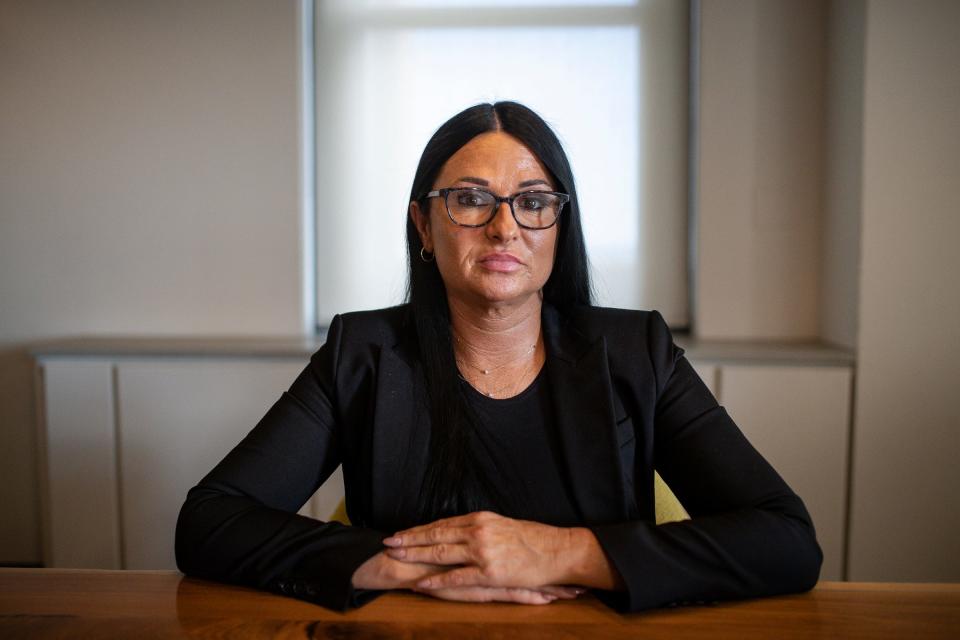Ex-Michigan prison officer sues: Supervisor wouldn’t leave me alone after relationship
LANSING — A former prison officer has sued the Michigan Department of Corrections over alleged sexual harassment, saying she had to quit the job she loved because a supervisor wouldn't leave her alone after she ended a brief romantic relationship.
Kristy Klenke, 45, whose allegations include sex discrimination and retaliation, says she can't understand why a department desperately short of corrections officers would rather lose someone like her than honor its dual pledges of "zero tolerance" for workplace sexual harassment and "no retaliation" for those who speak up about it.
For months, the department has been airing TV ads, paying hiring bonuses, and taking other extraordinary steps as it attempts to fill about 1,000 officer vacancies statewide that the officers union says have resulted in oppressive amounts of forced overtime and undermined prison safety.
"They need me in that job," Klenke, who quit in August, said in an interview with the Free Press at her attorney's office in Detroit.
Kyle Kaminski, a spokesman for the Corrections Department, said Wednesday the department can't comment "pending its investigation into the facts alleged in this recent filing."

Klenke, who joined the MDOC in December 2018, alleges in the lawsuit she briefly dated a supervisor, Sgt. Mario Cunningham, starting in April 2019. Then she found out Cunningham was married. She confronted him about that in June 2019 and told him that going forward, she only wanted a professional relationship with him, the complaint alleges.
But Cunningham, who has denied harassing Klenke, continued to text her and otherwise try to contact her, the suit alleges. He talked to others about their prior relationship so much that it was common knowledge not only among staff at the Michigan Reformatory in Ionia, which closed in November, but even the prisoners, Klenke said.
At the same time, officials messed with her work schedule and gave her undesirable or unsafe work assignments, such as requiring her to work near prisoners who knew personal information about her, or requiring her to work without a partner to back her up, Klenke alleges.
"It's already a dangerous job," Klenke said. "You want to know that when you go in there, that people respect you and people care if something happens to you."
On Monday, Klenke sued the department in Ionia County Circuit Court. Earlier, Klenke filed sexual harassment complaints against Cunningham in September 2019 and July 2020, and against another supervisor, who she says made a sexual remark when she complained about her work assignments, in March 2022. She also sued Cunningham and three other prison officials, but not the department itself, in February 2021. That case is still pending in federal court in Michigan's western district. And in June of this year, with the help of her union, Klenke filed a grievance with the MDOC, alleging a hostile work environment.
Two months later, with the grievance still pending, Klenke resigned. She said it got to the point where she did not feel safe and her health was suffering, due to the extra stress.
Cunningham is not named as a defendant in the lawsuit filed Monday, which only names the Michigan Department of Corrections. But in a filing in the federal lawsuit, Cunningham denied sexually harassing Klenke but acknowledged a three-month consensual relationship that Klenke ended. Cunningham said in a court filing he only texted Klenke once after she ended the relationship, to ask her to lunch, though he also admits to "inadvertently" adding Klenke to a SnapChat account in 2020 and telling another prison official he would like to be able to sit down with her. Cunningham denies he was Klenke's direct supervisor and denies altering her work schedule, saying he did not have the authority to do so. Cunningham acknowledged one previous sexual harassment complaint against him from another female employee, around 2015, which he said was determined to be unfounded.
The state normally provides legal representation for employees who get sued in connection with their jobs, but Cunningham is representing himself in the federal lawsuit. Neither the Attorney General's Office nor the Corrections Department would say why the state is not providing him with a lawyer.
Cunningham did not respond to emails from the Free Press.
Klenke said officials took no action in response to her first sexual harassment complaint, except that she was moved to a different shift with a lower rate of pay. Later, she was moved back onto the same shift Cunningham worked, making her uncomfortable as she encountered him in the workplace, the suit alleges. After her second complaint, in 2020, officials transferred Cunningham to another Ionia prison, Bellamy Creek Correctional Facility.

When Michigan Reformatory closed, Klenke said she would have been sent to Bellamy Creek, based on seniority, but was instead sent to Ionia Correctional Facility, considered a better assignment, because Cunningham was at Bellamy Creek. That created resentment among some fellow officers and Klenke said she received hostile treatment at that facility, where she said Cunningham had many friends.
But the department ignored her requests for a transfer away from Ionia to a prison in St. Louis or the Jackson area, she said. She said she was instead forced to quit despite having only one work rule violation on her record. That was the result of an argument with another officer, which was also related to the issues with Cunningham, she said.
The suit, which seeks unspecified damages, alleges three violations of Michigan's Elliott-Larsen Civil Rights Act: "Disparate treatment" based on her gender; retaliation; and creation of a hostile work environment.
Hannah Fielstra, Klenke's Detroit attorney, said Klenke did everything she should have done, in terms of filing complaints and a workplace grievance.
"Four years since she filed her initial grievance, she still has not seen accountability or any solution," Fielstra said.
Klenke said it was painful to sit through sexual harassment training at MDOC, where they preach "zero tolerance" of such conduct, when she had experienced sexual harassment and knew otherwise.
Also, "when you file formal paperwork, you become a target," she said.
Contact Paul Egan: 517-372-8660 or pegan@freepress.com. Follow him on X, formerly known as Twitter, @paulegan4.
This article originally appeared on Detroit Free Press: Ex-Michigan prison officer sues MDOC, says she was sexually harassed

